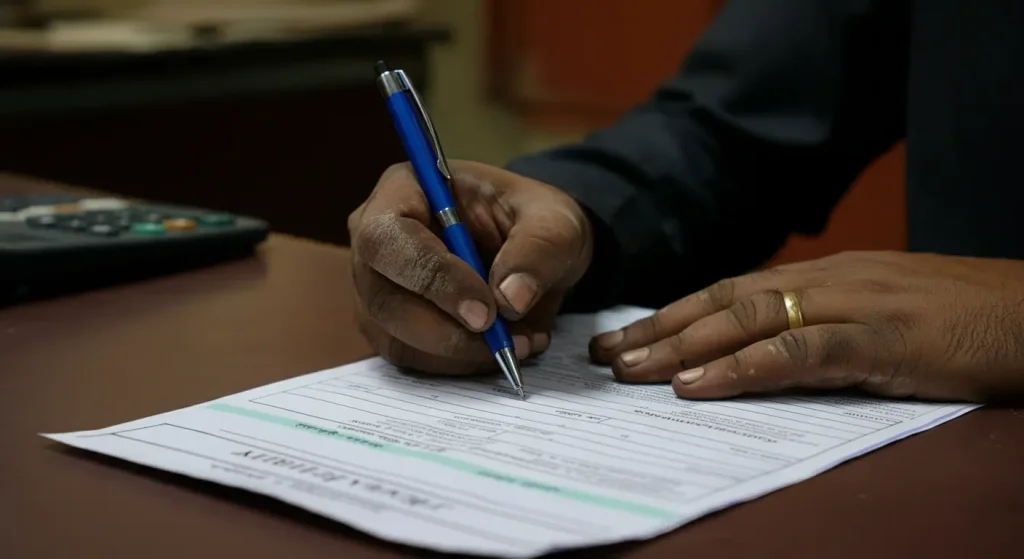Purchasing a property is a significant investment, and in India, it’s vital to ensure the property you’re buying has a clear and legitimate title. A defective title can lead to disputes, litigation, and even loss of your investment. This guide provides a detailed checklist of the 5 essential steps you should take to verify property titles before making any purchase, ensuring a smooth and secure transaction. This article will cover everything from title deeds, encumbrance certificates, and RERA checks, and legal advice so you can confidently navigate the Indian real estate market.
Step 1: Examine the Title Deed and Chain of Ownership

The title deed is the primary document that proves ownership of a property. It’s crucial to examine the current title deed and trace the chain of ownership for at least the last 30-40 years.
- How to do it:
- Request the current title deed (sale deed, mother deed, or conveyance deed) from the seller.
- Obtain copies of all previous title deeds, linking the current owner back to the original owner.
- Verify that the chain of ownership is unbroken and legally valid. Look out for any missing links, gaps, or discrepancies in the names and dates.
Step 2: Obtain an Encumbrance Certificate (EC)

An Encumbrance Certificate (EC) is a crucial document that reveals any registered liabilities, mortgages, or charges on the property. It indicates whether the property is free from any legal claims.
- How to do it:
- Apply for an EC at the sub-registrar’s office where the property is registered.
- In many states, you can also apply for an EC online through the respective state government’s land records website.
- Ensure the EC covers the period you’re investigating (ideally 30-40 years). A “Nil Encumbrance Certificate” signifies that the property is free from any encumbrances.
- Verify all the details mentioned in the EC such as owner’s name, nature of transaction, loan amount, etc.
Apply Here – https://www.india.gov.in/apply-online-encumbrance-certificate-0
Step 3: Verify the Property Tax Receipts and Utility Bills

Property tax receipts and utility bills serve as supplementary proof of ownership and can reveal any discrepancies in the property’s legal status.
- How to do it:
- Request copies of the latest property tax receipts and utility bills (electricity, water) from the seller.
- Verify that the bills are in the name of the current owner.
- Cross-check the property details mentioned in these documents with the title deed.
Step 4: Check the Approved Building Plan and Commencement Certificate (CC) & Occupancy Certificate (OC) (Especially for Apartments and Flats)

For apartments, flats, and new constructions, it’s essential to verify that the building has the necessary approvals from the local authorities.
- How to do it:
- Ask for a copy of the approved building plan sanctioned by the local municipal authority.
- Verify that the construction adheres to the approved plan. Any deviations could lead to legal issues.
- Check for the Commencement Certificate (CC), which is issued before construction begins, and the Occupancy Certificate (OC), issued after construction is completed and the building is deemed fit for habitation.
- Verify the property through RERA (Real Estate Regulatory Authority) website for your state.
Step 5: Seek Legal Advice from a Property Lawyer

Navigating the complexities of property law in India requires expert guidance. Consulting a qualified property lawyer is highly recommended.
- How to do it:
- Engage a reputable property lawyer with experience in Indian real estate law.
- Provide them with all the documents you’ve gathered.
- The lawyer will conduct thorough due diligence, verify the title, and provide you with a legal opinion on the property’s legality.
- They will also advise you on the stamp duty payable and registration process.
Conclusion:
Verifying property titles is a non-negotiable step when buying property in India. By diligently following these 5 steps and seeking legal advice, you can safeguard your investment, avoid potential legal disputes, and ensure a smooth and secure property purchase. Remember that thorough due diligence is key to making an informed decision and enjoying peace of mind.





